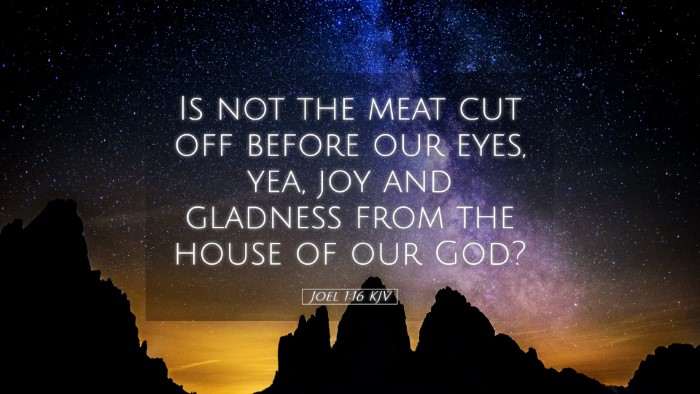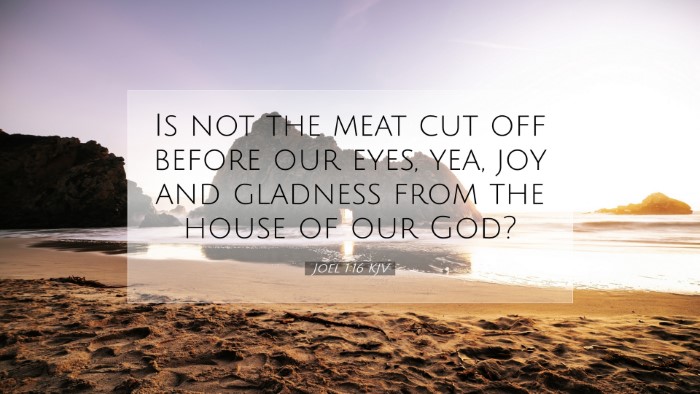Old Testament
Genesis Exodus Leviticus Numbers Deuteronomy Joshua Judges Ruth 1 Samuel 2 Samuel 1 Kings 2 Kings 1 Chronicles 2 Chronicles Ezra Nehemiah Esther Job Psalms Proverbs Ecclesiastes Song of Solomon Isaiah Jeremiah Lamentations Ezekiel Daniel Hosea Joel Amos Obadiah Jonah Micah Nahum Habakkuk Zephaniah Haggai Zechariah MalachiJoel 1:16
Joel 1:16 KJV
Is not the meat cut off before our eyes, yea, joy and gladness from the house of our God?
Joel 1:16 Bible Commentary
Bible Commentary on Joel 1:16
The verse Joel 1:16 states: "Is not the meat cut off before our eyes, yea, joy and gladness from the house of our God?" This scripture serves as a poignant reminder of the desolation that can befall a community, particularly in the context of a covenant relationship with God. This commentary will draw from several public domain sources to offer a thorough exploration of its theological implications.
Contextual Background
The Book of Joel addresses a severe locust plague that ravaged the land of Judah, leading to widespread devastation and calling the people to repentance. It serves as both a lamentation and a warning, illustrating the consequences of sin and neglecting the worship of God. Joel invariably connects physical calamity with spiritual apathy, making the understanding of this verse profound for community worship and theology.
Verse Analysis
To understand the full weight of Joel 1:16, it is essential to analyze its key components:
- The fine of 'meat cut off': This phrase underscores a critical reality—the loss of sustenance and resources necessary for worship and communal life, indicating a withdrawal of God’s blessings due to sin.
- Joy and gladness lacking: This speaks to the emotional and spiritual malaise that accompanies physical desolation. It reflects the deep-seated connection between agricultural health and spiritual vitality.
- 'House of our God': This refers to the Temple, symbolizing the heart of Israel’s worship and relationship with God—a place where joy should reside due to His presence.
Theological Insights
Albert Barnes emphasizes that this verse shows a great grieving over the loss of public worship and the communal aspects of faith. The absence of joy reflects a much deeper spiritual decay. It alerts the people to consider their disconnection from God, whose provision and presence are essential for true joy and gladness.
Matthew Henry suggests that Joel’s lamentation serves not only as a warning but a means of understanding the seriousness of sin and its consequences. The joy that should accompany communion with God is absent precisely because of the people’s disobedience and disregard for His commands.
Gaining Lessons from Desolation
The insights drawn from this scripture hold significant lessons for contemporary readers:
- The Importance of Corporate Worship: Joy and gladness within the congregation are predicated upon the purity and sincerity of worship offered to God.
- Consequences of Sin: The desolation reflected in this verse serves as a stark reminder that neglecting one’s spiritual duties leads to tangible consequences in life.
- Call to Repentance: Just as Joel called for repentance, believers today are reminded to evaluate the state of their spiritual lives and communities regularly.
Application for Today’s Believers
Adam Clarke urges that the application of this verse lies in understanding that joy can only flow from an authentic relationship with God. In times of drought—whether physically or spiritually—believers are encouraged to return to God, seeking His face earnestly and relying on His provisions.
Likewise, church leaders and pastors should heed the lessons of Joel 1:16, fostering environments where congregations can experience authentic joy derived from steadfast worship. The importance of leading a church in repentance, recognition of sin, and restoration to God cannot be overstated.
Conclusion
In conclusion, Joel 1:16 serves as a profound reminder of the relationship between physical conditions and spiritual health. The lament of the prophet invites all readers to reflect on their standing before God, the communal aspects of faith, and the consequences of sin. As such, this passage can be seen as a catalyst for introspection and revival within the church. The lessons echo throughout time, urging believers to reset their focus on true worship, leading to restored joy and gladness in the presence of God.


